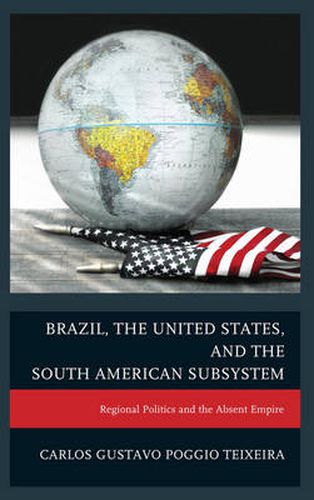Readings Newsletter
Become a Readings Member to make your shopping experience even easier.
Sign in or sign up for free!
You’re not far away from qualifying for FREE standard shipping within Australia
You’ve qualified for FREE standard shipping within Australia
The cart is loading…






This title is printed to order. This book may have been self-published. If so, we cannot guarantee the quality of the content. In the main most books will have gone through the editing process however some may not. We therefore suggest that you be aware of this before ordering this book. If in doubt check either the author or publisher’s details as we are unable to accept any returns unless they are faulty. Please contact us if you have any questions.
The United States has often acted as an empire in Latin America. Nevertheless, there has been an obvious dissimilarity between U.S. actions in South America and U.S. actions in the rest of Latin America, which is illustrated by the fact that the United States never sent troops to invade a South American country. While geographic distance and strategic considerations may have played a role, they provide at best incomplete explanations for the U.S.‘s relative absence south of Panama. The fact that the United States has had a distinct pattern of interactions with South America is thus not captured by the typical concept of Latin America.
In Brazil, the United States, and the South American Subsystem: Regional Politics and the Absent Empire, Carlos Gustavo Poggio Teixeira recuperates the virtually neglected literature on regional subsystems. In so doing, Teixeira maintains that researchers of inter-American relations would greatly benefit from a characterization reflecting actual regional realities more than entrenched preconceptions. Such a characterization involves subdividing the Western Hemisphere in two regional subsystems: North and South America. This subdivision allows for uncovering regional dynamics that can help explain the U.S.’s limited interference in South American affairs compared to the rest of Latin America. This book argues that the role of Brazil as a status quo regional power in South America is the key to understanding this phenomenon. Through a historical analysis focusing on specific cases spanning three centuries, this research demonstrates that Brazil, regardless of particular domestic settings, has deliberately affected the calculations of costs and benefits of a more significant US involvement in South America. While in the past Brazil has taken actions that resulted in increasing the benefits of the U.S.’s limited involvement in South America, in more recent times it has sought to increase the costs of a more significant U.S. presence. Teixeira then considers some of the theoretical and political implications of the framework laid out by this research. Brazil, the United States, and the South American Subsystem is a groundbreaking investigation of U.S.-Latin American relations and the politics of imperialism.
$9.00 standard shipping within Australia
FREE standard shipping within Australia for orders over $100.00
Express & International shipping calculated at checkout
Stock availability can be subject to change without notice. We recommend calling the shop or contacting our online team to check availability of low stock items. Please see our Shopping Online page for more details.
This title is printed to order. This book may have been self-published. If so, we cannot guarantee the quality of the content. In the main most books will have gone through the editing process however some may not. We therefore suggest that you be aware of this before ordering this book. If in doubt check either the author or publisher’s details as we are unable to accept any returns unless they are faulty. Please contact us if you have any questions.
The United States has often acted as an empire in Latin America. Nevertheless, there has been an obvious dissimilarity between U.S. actions in South America and U.S. actions in the rest of Latin America, which is illustrated by the fact that the United States never sent troops to invade a South American country. While geographic distance and strategic considerations may have played a role, they provide at best incomplete explanations for the U.S.‘s relative absence south of Panama. The fact that the United States has had a distinct pattern of interactions with South America is thus not captured by the typical concept of Latin America.
In Brazil, the United States, and the South American Subsystem: Regional Politics and the Absent Empire, Carlos Gustavo Poggio Teixeira recuperates the virtually neglected literature on regional subsystems. In so doing, Teixeira maintains that researchers of inter-American relations would greatly benefit from a characterization reflecting actual regional realities more than entrenched preconceptions. Such a characterization involves subdividing the Western Hemisphere in two regional subsystems: North and South America. This subdivision allows for uncovering regional dynamics that can help explain the U.S.’s limited interference in South American affairs compared to the rest of Latin America. This book argues that the role of Brazil as a status quo regional power in South America is the key to understanding this phenomenon. Through a historical analysis focusing on specific cases spanning three centuries, this research demonstrates that Brazil, regardless of particular domestic settings, has deliberately affected the calculations of costs and benefits of a more significant US involvement in South America. While in the past Brazil has taken actions that resulted in increasing the benefits of the U.S.’s limited involvement in South America, in more recent times it has sought to increase the costs of a more significant U.S. presence. Teixeira then considers some of the theoretical and political implications of the framework laid out by this research. Brazil, the United States, and the South American Subsystem is a groundbreaking investigation of U.S.-Latin American relations and the politics of imperialism.